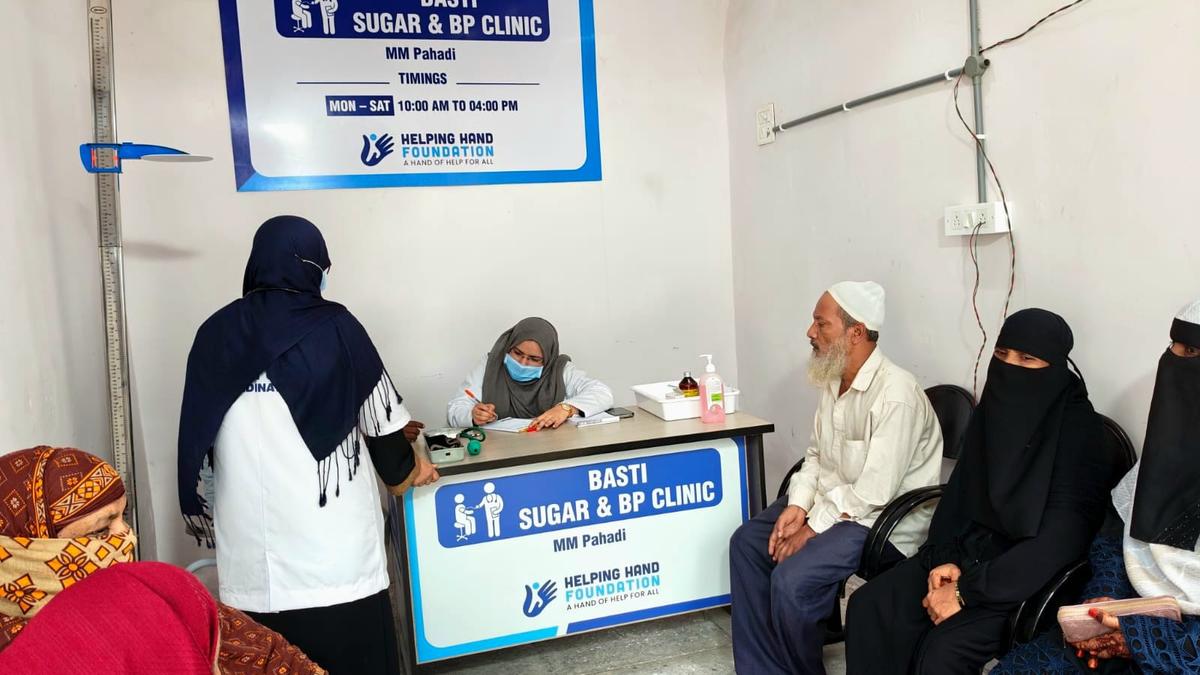Science
Helping Hand Foundation Launches NCD Health Initiative in Hyderabad

The Helping Hand Foundation (HHF), based in Hyderabad, has initiated a community health outreach programme aimed at addressing non-communicable diseases (NCDs) among vulnerable populations. This initiative draws inspiration from Tamil Nadu’s successful Makkalai Thedi Maruthuvam scheme, focusing on providing doorstep screening, consultations, and medicine delivery to residents in the Rajendranagar mandal.
Operations kicked off with the establishment of three NCD sub-centres in Mir Mahamod Pahadi Colony, Suleman Nagar, and Chintalmet. These areas collectively house approximately 65,000 to 70,000 individuals from low-income households, who have historically faced significant barriers in accessing healthcare. Each sub-centre is staffed by a doctor, a nurse, and three to four trained Community Health Workers (CHWs), who are responsible for covering between 200 to 250 households each. Their responsibilities include conducting door-to-door screenings for blood pressure, blood sugar levels, and body mass index (BMI) to identify both existing and at-risk NCD cases.
The HHF programme integrates a robust follow-up mechanism to ensure that patients adhere to their treatment regimens and make necessary lifestyle changes. In cases where complications arise, patients are referred to government hospitals for further care. An analysis of over 12,000 patient records from local urban settlements highlighted a significant concern: 45% of patients reported that travelling to public health centres was both expensive and inconvenient. Consequently, around 50% of these patients were found to be inconsistent with their treatments, thus increasing their risk of health complications.
Mujtaba Hasan Askari, a representative of HHF, emphasized the dire situation, stating, “Years of deprivation and weak access to healthcare have led to poor health-seeking behaviour among these communities.” A preliminary door-to-door survey involving 500 residents, with 70% being women and 30% men, further underscored the severity of the issue. The survey revealed that approximately 41% of respondents were diagnosed with NCDs. Among these individuals, 43% had diabetes, 30% suffered from hypertension, 15% had thyroid disorders, 5% were diagnosed with coronary artery disease, and 2.5% were newly diagnosed with diabetes. Alarmingly, nearly 60% of diabetes and hypertension cases were reported as uncontrolled.
The survey findings also indicated that 38% of individuals with NCDs were classified as obese, with two-thirds of this group suffering from both diabetes and hypertension. An additional 32% were overweight, and half of these individuals had been diagnosed with NCDs. Beyond focusing on diabetes and hypertension, the programme will provide periodic screenings for a range of other health issues, including eye disorders, oral health problems, kidney disease, non-alcoholic fatty liver disease, dementia, and various cancers, all at no cost to patients. Furthermore, provisions for spectacles and cataract surgeries will also be offered free of charge.
This initiative marks a significant step forward in improving healthcare access for underserved communities in Hyderabad, addressing critical health challenges while taking proactive measures to enhance the well-being of residents in Rajendranagar.
-

 World5 months ago
World5 months agoSBI Announces QIP Floor Price at ₹811.05 Per Share
-

 Lifestyle5 months ago
Lifestyle5 months agoCept Unveils ₹3.1 Crore Urban Mobility Plan for Sustainable Growth
-

 Science4 months ago
Science4 months agoNew Blood Group Discovered in South Indian Woman at Rotary Centre
-

 World5 months ago
World5 months agoTorrential Rains Cause Flash Flooding in New York and New Jersey
-

 Top Stories5 months ago
Top Stories5 months agoKonkani Cultural Organisation to Host Pearl Jubilee in Abu Dhabi
-

 Sports4 months ago
Sports4 months agoBroad Advocates for Bowling Change Ahead of Final Test Against India
-

 Science5 months ago
Science5 months agoNothing Headphone 1 Review: A Bold Contender in Audio Design
-

 Top Stories5 months ago
Top Stories5 months agoAir India Crash Investigation Highlights Boeing Fuel Switch Concerns
-

 Business5 months ago
Business5 months agoIndian Stock Market Rebounds: Sensex and Nifty Rise After Four-Day Decline
-

 Sports4 months ago
Sports4 months agoCristian Totti Retires at 19: Pressure of Fame Takes Toll
-

 Politics5 months ago
Politics5 months agoAbandoned Doberman Finds New Home After Journey to Prague
-

 Top Stories5 months ago
Top Stories5 months agoPatna Bank Manager Abhishek Varun Found Dead in Well









